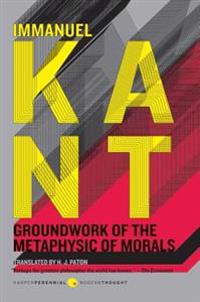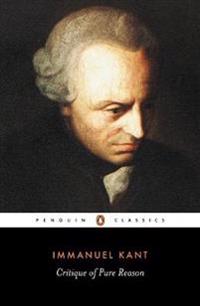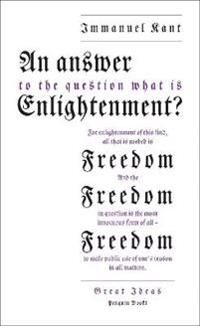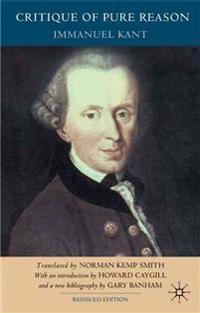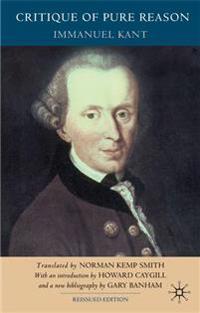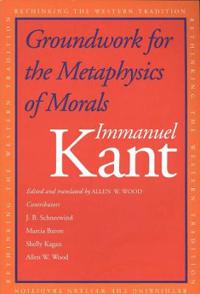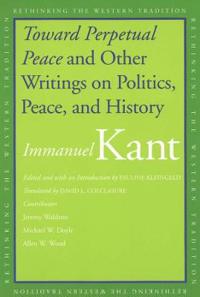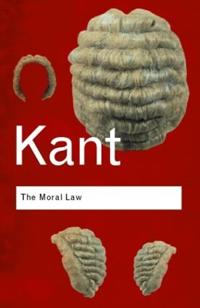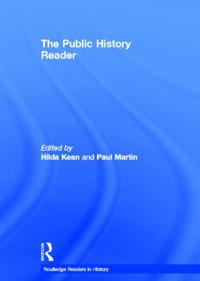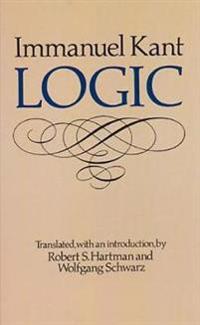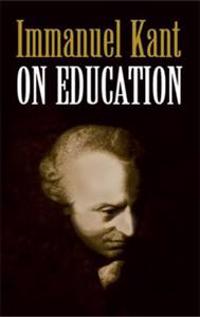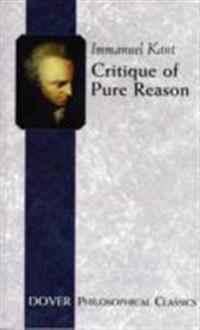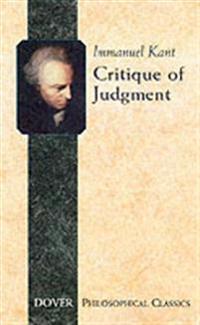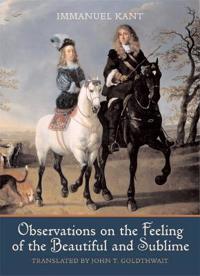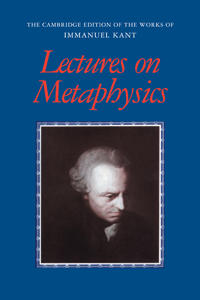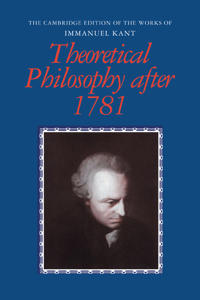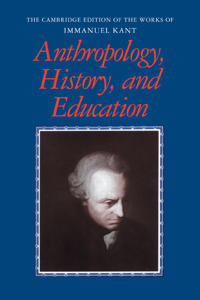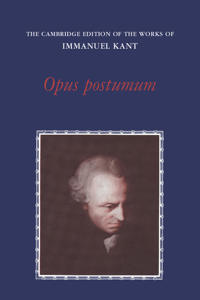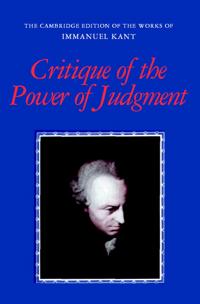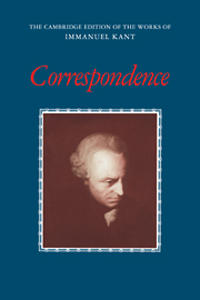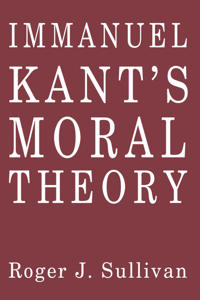Groundwork of the Metaphysic of Morals (Häftad)
avImmanuel Kant
ISBN: 9780061766312 - UTGIVEN: 200906Considered one of the most profound, influential, and important works of philosophy, Groundwork of the Metaphysic of Morals introduces the famous Categorical Imperative and lays down a foundation for all of Immanuel Kant's writings. In it, Kant illuminates the basic concept that is central to his mo[...]
Critique of Pure Reason (Storpocket)
avImmanuel Kant
ISBN: 9780140447477 - UTGIVEN: 200711In the "Critique of Pure Reason", Immanuel Kant laid out a framework upon which the whole of modern philosophy is based. This "Penguin Classics" edition is translated from the German and edited with an introduction by Marcus Weigelt, based on the translation by Max Muller. Kant's "Critique of Pure R[...]
An Answer to the Question: 'What is Enlightenment?' (Häftad)
avImmanuel Kant
ISBN: 9780141043883 - UTGIVEN: 200908Immanuel Kant was one of the most influential philosophers in the whole of Europe, who changed Western thought with his examinations of reason and the nature of reality. In these writings he investigates human progress, civilization, morality and why, to be truly enlightened, we must all have the fr[...]
An Answer to the Question: 'What Is Enlightenment?' (Häftad)
avImmanuel Kant
ISBN: 9780141399294 - UTGIVEN: 2010-10For the true bibliophile and design-savvy book lover, here is the next set of Penguin's celebrated Great Ideas series by some of history's most innovative thinkers. Acclaimed for their striking and elegant package, each volume features a unique type-driven design that highlights the bookmaker's art.[...]
Critique of Pure Reason (Inbunden)
avImmanuel Kant, Norman Kemp (TRN) Smith, Howard (INT) Caygill
ISBN: 9780230013377 - UTGIVEN: 2007-10Immanuel Kant's Critique of Pure Reason is both one of the most rewarding of all philosophical works, and one of the most difficult. Norman Kemp Smith's translation is immensely valuable, not simply because he rendered Kant's language into readable English, but also because his own extensive underst[...]
Critique of Pure Reason (Häftad)
avImmanuel Kant, Howard Caygill, Gary Banham
ISBN: 9780230013384 - UTGIVEN: 200708Immanuel Kant's Critique of Pure Reason is both one of the most rewarding of all philosophical works, and one of the most difficult. Norman Kemp Smith's translation is immensely valuable, not simply because he rendered Kant's language into readable English, but also because his own extensive underst[...]
Groundwork for the Metaphysics of Morals (Pocket)
avImmanuel Kant, Allen W. Wood, Allen W. Wood
ISBN: 9780300094879 - UTGIVEN: 200211Immanuel Kant's "Groundwork for the Metaphysics of Morals" is one of the most important texts in the history of ethics. In it Kant searches for the supreme principle of morality and argues for a conception of the moral life that has made this work a continuing source of controversy and an object of [...]
Toward Perpetual Peace and Other Writings on Politics, Peace, and History (Pocket)
avImmanuel Kant, Pauline Kleingeld, David L. Colclasure
ISBN: 9780300110708 - UTGIVEN: 200611Immanuel Kant's views on politics, peace, and history have lost none of their relevance since their publication more than two centuries ago. This volume contains a comprehensive collection of Kant's writings on international relations theory and political philosophy, superbly translated and accompan[...]
Moral Law: Groundwork of the Metaphysics of Morals (Häftad)
avImmanuel Kant
ISBN: 9780415078436 - UTGIVEN: 1992-12The Moral Law (Storpocket)
avImmanuel Kant
ISBN: 9780415345477 - UTGIVEN: 200501Few books have had as great an impact on intellectual history as Kant's The Moral Law. In its short compass one of the greatest minds in the history of philosophy attempts to identify the fundamental principle 'morality' that governs human action. Supported by a clear introduction and detailed summ[...]
The Public History Reader (Inbunden)
avImmanuel Kant
ISBN: 9780415520409 - UTGIVEN: 201302Drawing on theory and practice from five continents, The Public History Reader offers clearly written accessible introductions to debates in public history as it places people, such as practitioners, bloggers, archivists, local historians, curators or those working in education, at the heart of hist[...]
Logic (Pocket)
avImmanuel Kant
ISBN: 9780486256504 - UTGIVEN: 198804First and only English translation of highly influential classic--most accessible introduction to Kant's system; essential for understanding three Critiques.
[...]Critique of Pure Reason (Häftad)
avImmanuel Kant
ISBN: 9780486432540 - UTGIVEN: 200401One of the cornerstone books of Western philosophy, "Critique of Pure Reason is Kant's seminal treatise, where he seeks to define the nature of reason itself and builds his own unique system of philosophical thought with an approach known as transcendental idealism. He argues that human knowledge is[...]
Critique of Judgement (Häftad)
avImmanuel Kant
ISBN: 9780486445434 - UTGIVEN: 200512This 1790 polemic by one of philosophy's most important and influential figures attempts to establish the principles that support the faculty of judgment. Kant's third critique--after "Critique of Practical Reason and "Critique of Pure Reason--remains one of the most important works on human reason.[...]
Observations on the Feeling of the Beautiful and Sublime (Häftad)
avImmanuel Kant
ISBN: 9780520240780 - UTGIVEN: 200401When originally published in 1960, this was the first complete English translation since 1799 of Kant's early work on aesthetics. More literary than philosophical, Observations shows Kant as a man of feeling rather than the dry thinker he often seemed to readers of the three Critiques.[...]
Lectures on Metaphysics (Pocket)
avImmanuel Kant, Karl Ameriks, Steve Naragon
ISBN: 9780521000765 - UTGIVEN: 200110The purpose of the Cambridge Edition is to offer translations of the best modern German edition of Kantâs work in a uniform format suitable for Kant scholars. When complete (fourteen volumes are currently envisaged) the edition will include all of Kantâs published writings and a generous s[...]
Theoretical Philosophy After 1781 (Pocket)
avImmanuel Kant, Henry Allison, Peter Heath
ISBN: 9780521147644 - UTGIVEN: 201006This volume, originally published in 2002, assembles the historical sequence of writings that Kant published between 1783 and 1796 to popularize, summarize, amplify and defend the doctrines of his masterpiece, the Critique of Pure Reason of 1781. The best known of them, the Prolegomena, is often rec[...]
Anthropology, History, and Education (Häftad)
avImmanuel Kant
ISBN: 9780521181211 - UTGIVEN: 201102Anthropology, History, and Education, first published in 2007, contains all of Kant's major writings on human nature. Some of these works, which were published over a thirty-nine year period between 1764 and 1803, had never before been translated into English. Kant's question 'What is the human bein[...]
Opus Postumum (Häftad)
avImmanuel Kant
ISBN: 9780521319287 - UTGIVEN: 1995-02This volume is the first ever English translation of Kant?s last major work, the so-called Opus Postumum, a work Kant himself described as his ?chef d?oeuvre? and as the keystone of his entire philosophical system. It occupied him for more than the last decade of his life. Begun with the intention o[...]
Critique of the Power of Judgment (Pocket)
avImmanuel Kant, Paul Guyer, Eric Matthews
ISBN: 9780521348928 - UTGIVEN: 200112The Critique of the Power of Judgment (a more accurate rendition of what has hitherto been translated as the Critique of Judgment) is the third of Kantâs great critiques following the Critique of Pure Reason and the Critique of Practical Reason. This entirely new translation of Kantâs mast[...]
Correspondence (Inbunden)
avImmanuel Kant
ISBN: 9780521354011 - UTGIVEN: 1999-05This is the most complete English edition of Kant?s correspondence that has ever been compiled. The letters are concerned with philosophical and scientific topics but many also treat personal, historical, and cultural matters. On one level the letters chart Kant?s philosophical development. On anoth[...]
Natural Science (Inbunden)
avImmanuel Kant
ISBN: 9780521363945 - UTGIVEN: 2012-10-04Brings together work by Kant never before available in English, and new translations of his important publications in natural science.[...]
Immanuel Kant's Moral Theory (Pocket)
avRoger J. Sullivan
ISBN: 9780521369084 - UTGIVEN: 1989-03This book, sure to become a standard reference work, is a comprehensive, lucid, and systematic commentary on Kant?s practical (or moral) philosophy. Kant is arguably the most important moral philosopher of the modern period; yet, prior to this area in a single volume. Using as nontechnical a languag[...]
Immanuel Kant: Groundwork of the Metaphysics of Morals (Inbunden)
ISBN: 9780521514576 - UTGIVEN: 2011-02Published in 1785, the Groundwork of the Metaphysics of Morals is one of the most powerful texts in the history of ethical thought. In this book, Immanuel Kant formulates and justifies a supreme principle of morality that issues universal and unconditional moral commands. These commands receive thei[...]

